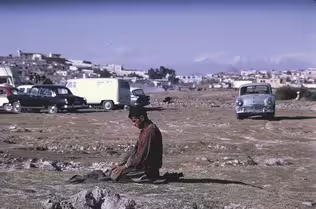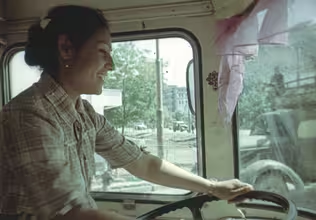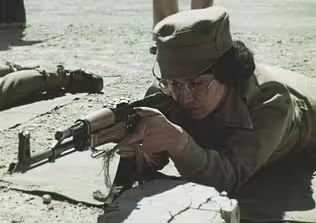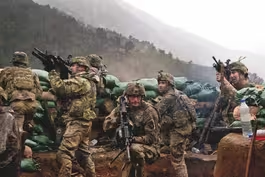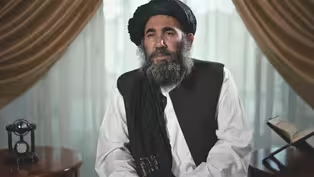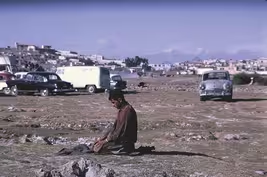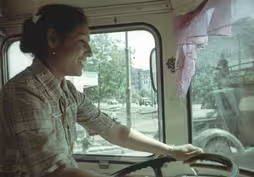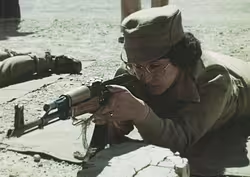
Afghanistan: The Wounded Land - Part 2: Jihad
Season 5 Episode 2 | 53m 23sVideo has Closed Captions
In 1979, the Soviets invaded Afghanistan. "Soviet Vietnam" began after a call for Jihad.
In 1979, the Soviet army invaded Afghanistan; Afghans called for Jihad. The country turned into the epicenter of a struggle between Islam and Communism. The U.S. and the Arab world sent weapons and money to the Afghan resistance and foreign fighters, including a young Osama Bin Laden, joined in. A decade later, the Mujahideen pushed back the occupation, contributing to the Soviet Union's collapse.
Problems playing video? | Closed Captioning Feedback
Problems playing video? | Closed Captioning Feedback
Funding provided by the Corporation for Public Broadcasting. Additional funding provided by the John D. and Catherine T. MacArthur Foundation and the Wyncote Foundation.

Afghanistan: The Wounded Land - Part 2: Jihad
Season 5 Episode 2 | 53m 23sVideo has Closed Captions
In 1979, the Soviet army invaded Afghanistan; Afghans called for Jihad. The country turned into the epicenter of a struggle between Islam and Communism. The U.S. and the Arab world sent weapons and money to the Afghan resistance and foreign fighters, including a young Osama Bin Laden, joined in. A decade later, the Mujahideen pushed back the occupation, contributing to the Soviet Union's collapse.
Problems playing video? | Closed Captioning Feedback
How to Watch Doc World
Doc World is available to stream on pbs.org and the free PBS App, available on iPhone, Apple TV, Android TV, Android smartphones, Amazon Fire TV, Amazon Fire Tablet, Roku, Samsung Smart TV, and Vizio.
Providing Support for PBS.org
Learn Moreabout PBS online sponsorshipMore from This Collection
In the 1960s, Afghanistan opened to the world but was at a crossroads. And when communists seized power, a never-ending war began. The four-part series looks at six decades of Afghan history through the eyes of those who were there, opening new perspectives into the country, people and destiny. The documentary also grants insight into what went wrong in the past and what future is being hoped for.
Afghanistan: The Wounded Land - Part 4: Trap
Video has Closed Captions
After 9/11, the U.S. invaded Afghanistan. Many Afghans hoped for peace and democracy. (54m 27s)
Afghanistan: The Wounded Land - Part 3: Taliban
Video has Closed Captions
While fighting in Afghanistan turned into a civil war, the Taliban emerged triumphantly. (54m 5s)
Afghanistan: The Wounded Land - Part 1: Kingdom
Video has Closed Captions
Afghanistan opened to the world in the 1960s. When communists seized power, a war began. (54m 4s)
Providing Support for PBS.org
Learn Moreabout PBS online sponsorshipANNOUNCER: The following program contains material that may be disturbing.
Viewer discretion is advised.
When the Soviet army invaded Afghanistan in 1979, the Afghans fought back.
MASOOD KHALILI: People were mobilized around word of jihad.
Means "fight for freedom."
ANNOUNCER: The Soviets struggled to fight the U.S.-backed mujahideen armies as the war raged in the mountains.
"Afghanistan: The Wounded Land-- Jihad," on DocWorld.
♪ (horse neighing) (people shouting) KHALILI: I was in the mountains of Nuristan.
The roads were controlled by the Soviets.
I went with my donkey.
It was new for me, going not by a car, but with a donkey.
(donkey braying) Bombardment started, and I was hiding myself.
I saw, and said, "Oh, my goodness," like flying dragons.
The roars of the planes.
I just rushed into cave, stayed there, five or ten minutes, a lot of sound, and then quiet, silent, totally.
And then a lot of shouting, crying, kind of... Kind of thing that I couldn't believe it.
I saw that my donkey, my donkey, my donkey... (chuckling): Donkey was wounded.
♪ And that I never forget.
My donkey was dying.
The eye was full of blood.
And I sat there, as he was talking to me.
"Why you fight?
(guns firing) "What's wrong with you?
"Who you are?
"Have you ever seen a donkey burning the house "of another donkey?
No!"
♪ The war has started.
Oh, gosh, what a war.
(guns firing) (explosion roars) ♪ (laughing and calling) (man chanting over speaker in distance) NARRATOR: On a cold winter day in December 1979, the Soviet army entered Afghanistan.
The country was on the brink of civil war.
(applauding) Thousands of people were taking to the streets to protest the Afghan communist regime that had seized power with a violent coup a year and a half earlier.
(man speaking over loudspeaker, people talking in background) After months of riots and repression, the Soviet Union sent troops to support their Afghan allies and bring the situation under control.
Afghanistan had to remain a socialist state.
(cheering and applauding) ♪ AUSHEV (speaking Russian): (military band playing) (people talking, calling in background) SIMA SAMAR: Soviet came to support this regime, this brutal regime, so how can you support an invasion which support a brutal regime?
♪ I have been a student in a medical faculty and I was part of the resistance.
We were distributing night letters, we were writing on the wall during the night, "Death to Russian!
", "Get out of our country!
", and so on.
To encourage people to resist against the invasion and against the regime.
NARRATOR: The fight against the "godless Soviets" united both peasants in the countryside and members of the elite.
♪ KHALILI: Right from the beginning in my life, living amongst my people, I knew that we were strong Muslims, and still we are, but not Islamist.
But not fanatic.
But whenever there was an invasion, people were mobilized around word of jihad.
Means "fight for freedom."
(wind howling) I thought the Russians, they don't have any belief, they're godless.
I should not be with communists.
And I should be with my people.
And I joined the war.
(man speaking Afghan language) NARRATOR: The Islamists had led the protests against the communist government.
After the Soviet invasion, they turned the resistance into a jihad.
They called themselves the mujahideen: "holy warriors."
(men speaking in Afghan language) ♪ REPORTER: Mujahideen are ready to die rather than submit to the domination of the Russians.
The Afghans feel very strong.
But even if we don't have more chance, but still, we'll fight to the last drop.
REPORTER: Now, many of the men here are smiling, and cheering, and singing songs.
How many of them are going to survive?
MAN: Well, we can't say-- maybe none of them will survive.
But that's what we have decided, that we will kill ourself or we will make it.
(wind howling) NARRATOR: The bravery of the mujahideen inspired people across the country.
The myth of the freedom fighters was born.
♪ BARAKZAI: I remember, when I become teenager, one of my dream was that we will go, and we will distribute water to the freedom fighters.
At that time, I had no knowledge about why they're fighting, how is the fight, only that was my dream that I could go and I could help them.
REPORTER: Can these largely illiterate and totally undisciplined tribesmen actually defeat the military might of the Russian forces?
NARRATOR: The mujahideen were poorly equipped and lacked modern weapons.
They were playing David to the Soviet army's Goliath.
When war comes to a place, it often happens that one man's misery becomes another man's profit.
Well, here in Darra, on the Northwest Frontier, they deal very profitably in death, for this is the street of a thousand gunsmiths.
(people calling and talking in background) With very little persuasion, you can get a rundown of the stock in Mr. Haji's shop.
Yeah, how much is that?
(woman speaking Pakistani language) - 1,600 rupees.
REPORTER: 1,600 rupees?
- Yes.
(trigger clicks) Shooting position.
♪ (men speaking Afghan language) MAN (translated): We are not being helped with arms.
We are buying our guns and ammunition from Derra with our own money, and no one has helped us with this.
- (translated): Otherwise, we could finish the war in 20 days.
♪ KHALILI: When you stand and have a dream, you win.
Because you have a hope.
When you have a hope, you live.
If you don't have a hope, you die every minute.
I said, "Let us go to the world.
"Because they have everything.
"In our hand, what we have?
Stone."
(chuckles) Can you fight with a stone?
Yes.
Can you win it?
Yes.
How long it will take?
I don't know.
This is why I need help.
♪ NARRATOR: Help was quickly found.
In the logic of the Cold War, where the enemy of my enemy is my friend, the Afghan conflict was a welcome opportunity for the United States.
♪ BEARDEN: Our first reaction to the Soviet invasion, it was a great shock, because some in the C.I.A.
thought this is really not a good idea from even the Soviet point of view.
But they still went in.
This invasion is an extremely serious threat to peace.
A Soviet-occupied Afghanistan is a stepping-stone to possible control over much of the world's oil supplies.
NARRATOR: The U.S. reaction to the Soviet invasion was swift, articulated by then-National Security Adviser Brzezinski.
ZBIGNIEW BRZEZINSKI: I wrote to the president on the day after the invasion a memorandum in which I outlined what we ought to do.
And a key sentence in it was, "We now have a historic chance to give the Soviet Union its Vietnam."
BEARDEN: Brzezinski was a brilliant guy.
He was sent out to Pakistan to reach a bargain, which would allow us to operate on their soil to provide assistance to the Afghan resistance, the mujahideen.
(people talking in background) NARRATOR: In Pakistan, Brzezinski made a historic speech to the mujahideen.
That land over there is yours.
You'll go back to it one day because your fight will prevail, and you'll have your homes, your mosques back again.
Because your cause is right.
God is on your side.
BEARDEN: Here's the national security adviser.
It showed that America was back in business, and from there on, we moved into action-- we, the C.I.A.-- and never let up.
So we started with, maybe, what, ten, 15, $20 million, to buy a few guns.
And it kept getting more and more.
Another $20 million, another $100 million.
And, but it was still... peanuts.
That's not a lot of money.
But we were beginning to make a difference.
REPORTER: Have you bought many guns for Afghanistan?
- Yes, many gun.
REPORTER: How many?
- About, uh, 30,000.
REPORTER: 30,000?
- Yes.
REPORTER: Where does... That's a lot of rupees.
Where does the money come from?
- This come America.
REPORTER (laughs): From America?
- Yes.
(firing) ♪ NARRATOR: The nearest Pakistani city to Kabul and the Afghan border is Peshawar.
REPORTER: After the Soviet occupation, Afghanistan's mujahideen claimed Peshawar as their capital in exile.
This is just one of countless headquarters that have sprung up in Peshawar.
BEARDEN: You can't escape the atmosphere of Peshawar.
If anything describes it, it's the bar scene in the movie Star Wars.
Everybody is there.
The mujahideen are there.
KGB spies are there.
C.I.A.
is there.
Every other intelligence service.
The good, the bad, and the ugly.
Everybody is there.
♪ NARRATOR: Peshawar became a hub for the resistance.
But the mujahideen were not united.
Divided along ethnic lines, seven different factions competed for weapons coming from abroad.
REPORTER: That where we were just now was just one rebel organization.
Here, 40 yards down the road, is another.
♪ GIRARDET: I arrived a few days after the Soviet invasion.
And if you wanted to cover the Afghan story, you had to go to Peshawar.
Most of the journalists, including myself, were very na ïve in the beginning.
You'd go talk to these political leaders who immediately began telling you these very tall tales about what they'd achieved.
You know, they had attacked a convoy of Soviets that killed so and so many hundred.
And it was all lies.
♪ REPORTER: In Peshawar, incidents do tend to become exaggerated.
If all the claims of the Islamic guerrillas were totted up, then almost the entire Soviet force of over 100,000 men would have been destroyed.
If you destroy 100 tanks, if it's not in the media, nothing has happened.
Then I rush to Pakistan back and I try to find all the media.
Exaggerating also, sometime.
To attract them, you know.
"We destroyed 25 tanks!"
Which we had destroyed one.
(chuckling) Really.
"We, we killed... 100 Russians."
Maybe two.
♪ REPORTER: How many Soviet soldiers his troop have killed?
(speaking Afghan language) - Almost 800 persons.
REPORTER: And how many weapons have they captured?
- 10,000 in number.
REPORTER: 10,000 rifles?!
- Yes, rifles.
GIRARDET: These political leaders realized the more they were cited on V.O.A.
or the BBC, the more support they would get from the Americans, from the C.I.A., and so on, so it was very, very important for them to have this PR.
BEARDEN: Each of those party leaders had their own strange combination of good and evil.
But the point was to defeat the Soviet Union.
♪ KOZHUKHOV (speaking Russian): ♪ NARRATOR: The Soviets helped the Afghan government not only with troops and weapons, but with huge investments to support development of the country.
Kabul began to look like a socialist capital.
Women gained near equal rights to men.
Some even joined the fight against the mujahideen.
(guns firing) SAMAR: The government had their own style of woman.
I mean, they encouraged more women to come and sing on the, on the stages.
They were talking about more women's freedom.
But, unfortunately, from the mujahideen side, there was nothing for women except beating them up, and should have hijab, and should not work, should not do anything.
When the government was saying, "Education for women," they said, "No education."
"Freedom for women," "No freedom for women."
So it was... Woman actually was used as a political tool by both side.
NARRATOR: The Soviet army planned to restore order in Afghanistan without major fighting.
But as it faced a growing resistance in the mountains, a short mission turned into an endless war.
(playing) (singing in Russian): KOZHUKHOV: AUSHEV: (guns firing) (in Russian): ♪ (speaking Russian) REPORTER: Over 100,000 Soviet troops are stationed in Afghanistan.
They have modern equipment, modern weapons, and modern means of transportation.
But they can do little against the ambushes of the Afghan guerrilla.
On the road, the enemy watches the Soviet convoys and prepares the trap.
♪ The first and last vehicles are rocketed and set on fire.
When the mujahideen's assault begins, the Soviet soldiers realize they are helpless.
The enemy will not take prisoners.
(in Russian): ♪ NARRATOR: The guerrilla tactics of the mujahideen proved successful, and one of their most skilled commanders was about to become a legend.
GIRARDET: In 1981, I was approached by Masood Khalili, who has been talking with me about doing this trip into Afghanistan.
And he said, "You've got to go up there, because there is this extraordinary Afghan commander called Ahmad Shah Masood."
And he said, "That would be a great story for you.
"And also, the French doctors are working up there with him."
♪ FOURNOT (speaking French): ♪ MAN (in Dari): You obviously couldn't take a bus or fly because occupied country.
So, we had to walk and go take horses with us.
FOURNOT: And then you came to the foot of these 5,000-meter-high mountain passes, and you had to walk up them.
It took hours for the horse caravans to get up.
And I kept thinking, "I'm in the 19th century here."
FOURNOT: GIRARDET: I remember getting to the top, and I could see probably 100 kilometers into the Hindu Kush-- these mountains, snow-topped mountains, and in all directions.
And I just thought, "Afghanistan!
This is it!"
(wind howling) FOURNOT: GIRARDET: When we actually got to the Panjshir Valley, we got the word that we had to meet this guy Massoud.
And suddenly, Massoud came with three or four men all with Kalashnikovs.
And I, I burst out laughing.
Because he looked exactly like Bob Dylan.
FOURNOT: REPORTER (in French): - (in French): REPORTER: Ahmad Shah Massoud, perhaps the most gifted guerrilla leader in the whole of Afghanistan.
Although he's only one of five or six major Afghan resistance leaders, he is the most glamorous, the most successful, and the best known.
I was always proud to be his friend.
He was a good human being.
And always he had a plan.
MASSOUD (in Dari): - Enemy is about 300 people.
KHALILI: He was smart enough to understand his people and trust his people.
Leadership is very important in a guerrilla warfare.
He has become and proved to be a charismatic guerrilla leader of Afghans inside Afghanistan.
(man speaking Afghan language) BARAKZAI: We never seen his photo, but everybody was talking about how brave he is.
He's alone and he is climbing in the mountains, killing the Russians.
(speaking Dari): ALL: Allahu akbar!
(people shouting) ♪ NARRATOR: A revolution eats its own children, they say.
Competition for money, weapons, and glory generated conflict between mujahideen commanders.
The most heated rivalry was between Massoud and Hekmatyar, the powerful Islamist leader.
♪ (translated): In Afghanistan, the faithful mujahideen are fighting to establish a pure Islamic government.
And they are selflessly offering their lives, taking up arms in order to establish a foundation for the Sharia of Islam and the fundamental Islamic way.
In the effort to provide assistance to the Afghan groups, uh, people took the easy route and defined them as fundamentalists and moderates.
After I got there, I thought, "Who thought that up?"
They were all pretty fundamental in what they were going to do about this Soviet invasion.
If Massoud was a darling of the French and the British, then Hekmatyar was misunderstood mostly in the West.
They just think he's a beast and evil, but he is probably among the most brilliant, in a dark sense, of all the mujahideen leaders.
Was he effective?
Yeah, he was.
I was able to pay some of his very close commanders.
He readily accepted the assistance, but he was very resistant to our involvement.
(man calling in Afghan language) (all responding) HEKMATYAR (speaking Afghan language): NARRATOR: The tensions between mujahideen commanders escalated over the years and had a devastating impact.
(all chanting) I can't say that we were 100% right, you know?
This distance between Massoud and Hekmatyar started and it became more and more, deeper and deeper, in such a way that even some of our commanders fought against his commanders inside Afghanistan while we were fighting against the Soviets.
And the people hated both of us.
♪ ♪ (laughing) ♪ (speaking Russian): REPORTER (speaking Russian): (car horn beeps) KOZHUKHOV: ♪ REPORTER (speaking Russian): REPORTER (speaking Russian): ♪ (siren wailing) SAMAR: I decided to leave Kabul because I was not feeling safe.
Just took my son and I went with a stethoscope, with a BP apparatus, and one current internal medicine book.
So, I decided to move to Pakistan.
NARRATOR: By 1985, after six years of combat, it became clear that the Soviet army was stuck in a stalemate, while the resistance kept growing.
FARID MAZDAK (speaking Afghan language): ♪ AUSHEV (speaking Russian): (guns firing) (speaking Russian): (helicopter firing) MAN (speaking Russian): (fires) KOZHUKHOV (speaking Russian): (firing) AMIN KARIM (speaking French): (guns firing, bullets whistling) Allahu akbar!
(fires) KARIM: (all yell and cheer) KARIM: ♪ (explosion echoes) (wind whipping) KHALILI: More than a million people died in that war.
More than 200,000 were wounded and maimed, with no leg, no hand.
And thousands become refugees in front of me, going to another country.
REPORTER: The sprawling refugee camps on the Pakistani side of the border provide indisputable evidence of the continuing crisis.
REPORTER: Since the Soviet invasion of Afghanistan in 1979, nearly three million Afghans have poured across Pakistan's long unguarded border.
(people talking in background) FOURNOT (speaking French): (both speaking Dari): GIRARDET: I talked to a lot of refugees coming out, making their way toward Pakistan.
And they'd been walking up this very, very difficult mountain pass.
Children forced to walk, you know, you know, men carrying their kids.
It was the most pathetic sight.
They would sleep in the mountain passes overnight, and of course, they would die of exposures.
And that's where you saw what impact of war is.
You would always see grave upon grave upon grave of people who died.
MAN: Life is dangerous in Afghanistan.
I have to escape from Afghanistan, our lovely country, to go to the Pakistan to join with our brother and... Muslim brother.
Even I personally lived through all these things and I...
Sometime when I think that, how much capacity you as a human have.
How much resilience you can build.
How much capacity you would have to digest all this.
(inhales) And I think we should burst, we should turn to pieces with all this, um, pain.
(screaming in Afghan language) (wailing) When Afghanistan was under the occupation of the Soviets, the news of human suffering went to the Muslim world.
There were boys who wanted to come and help Afghan war against the Soviets.
ABDULLAH ANAS: My age was 23, 24 years in that time.
I was living in the West of Algeria.
I read that Afghanistan was occupied by Soviet Red Army, and Muslims should help their brothers in Afghanistan to liberate their land.
Afghanistan became very famous in the Arab world.
And then everyone started thinking how to join, how to help, how to go.
GIRARDET: I first started coming across Arabs in Peshawar, when you had these rather wealthy Saudis who would turn up, or from the Emirates, and they literally had suitcases with them full of money.
It wasn't military in the early days, it was humanitarian.
It was clinics, schools, and mosques-- primarily mosques.
And even bin Laden, he began as a humanitarian.
♪ ANAS: I found Osama bin Laden active full-time in Peshawar.
I remember two guest houses to welcome the Arabs when they come, before they send them inside Afghanistan.
Osama bin Laden used to give the money for this.
You know, rent, expenditure, one small car to bring the shopping to the... Telephone for, the bills, this, this.
And he continued doing like that till '8... late '87.
NARRATOR: In Peshawar, the Arabs were reaching out to Afghan refugees, recruiting from the youngest among them.
(man chanting) SAMAR: All these Arabs who were involved, I mean, I seen it.
They train them to be that extreme.
In all the camps, they build, build madrassas, the religious schools, so called.
The Afghan families give the male children to these madrassas to be educated, to be feeded.
Then they were kept over there to segregate them, to train them, to brainwash them.
They were the one who'll become Taliban.
No education, no formal education.
(speaking Dari): BOYS: Allahu akbar!
(call-and-response continues) (speaking Dari): People called some of them fanatics.
Yeah, everybody has a fanatic somewhere deep inside them.
If, if you bring in 120,000 Soviet troops and kill a million people and wound a million and a half and drive five million into exile, you might get a little fanatic.
(speaking Dari): (laughs) (man grunts) Politics is always dirty.
And the countries who were involve, they choose the most conservative group of people and trained them and made them monsters just to get rid of the USSR.
Allahu akbar!
(weapons firing) (explosions echoing, guns firing) KOZHUKHOV (speaking Russian): (wind howling) NARRATOR: In 1986, Moscow admitted that it was impossible to win against a guerrilla force that had the support of the population and was supplied by the West and the Arab world.
♪ (speaking Russian): (audience applauding) NARRATOR: It was the new Soviet leader, Mikhail Gorbachev, who finally sought a way out of the Afghan trap.
(speaking Russian): NARRATOR: For U.S. President Ronald Reagan, the USSR was the Evil Empire.
In the struggles of the Soviet army, Reagan saw an opportunity to give the enemy a final blow.
American support of the Afghan "freedom fighters" escalated.
REAGAN: When we support the Afghan people, we become caught up in and ennobled by their struggle for freedom.
Isn't that what America has always stood for, and what we should stand for in 1986 and beyond?
BEARDEN: Up to that point, I believe U.S. policy was to bleed the Soviets, to fight to the last Afghan, and Ronald Reagan, who had this sense of morality, of right and wrong, and things like that, they decided they weren't going to fight to the last Afghan anymore-- they were going to give them whatever they needed to win.
The head of C.I.A.
said, "I'm going to give you a billion dollars this year.
Do you think that's enough?"
Well, how would I know what a billion dollars, whether it was enough or not?
I didn't know it.
I said, "Let me try."
And so, C.I.A.
then began to really move on the Afghan thing.
It was sort of, "Patience, my ass.
Let's get out there and shoot some Russians!"
The mujahideen had been slaughtered by Soviet gunships, and nothing we were able to give them would work effectively, so we said, "You can have Stinger missiles."
(speaking Afghan language) KHALILI: Stingers was one of the most effective anti-air missile.
It was light, it was moveable, not difficult to learn.
Put on your shoulder, and the rocket goes, and the plane comes down.
(fires) By the first shot, we told the Russians, "You are no longer the king of the air.
We can stop you."
And that was the beginning of their defeat.
(people talking in background) NARRATOR: As the Soviets negotiated their withdrawal, life in Kabul became unbearable.
The mujahideen had almost sieged the city.
Fuel and food became scarce, and more people wanted to flee.
(people talking in background) The Soviet Union today formally agreed to pull its troops out of Afghanistan.
(people talking in background) KOZHUKHOV (speaking Russian): BEARDEN: You wanna fight a war?
Be on the side of the resistance, and you'll always win-- they don't lose.
What did the C.I.A.
effort cost over a ten-year period from December 1979 to February 1989?
Five or six billion dollars?
Five or six billion dollars is, what, a month of our efforts in Afghanistan today?
One month?
With no chance of winning?
One month.
NARRATOR: In 1989, the Soviet expedition into Afghanistan finally came to an end.
Ten years after its start.
The communist government in Kabul was left alone to deal with a divided nation and an economy in tatters.
The war left 15,000 dead on the Soviet side, and an estimated one million Afghan victims.
(audience applauding) But the Soviet withdrawal would not end the war in Afghanistan.
HEKMATYAR (speaking Afghan language): (cheering and yelling) NARRATOR: Against all odds, the mujahideen resisted the mighty Soviet army for ten long years.
Now they got ready to overrun the communist government in Kabul.
But the conflicts between the commanders would open the next dark chapter in the country's history.
♪ KHALILI: The day I saw the Soviet tanks leaving Afghanistan, the back of the tanks going out of Afghanistan, that was a day that I indeed thought that what we dreamed now comes true.
But...
Immediately, I felt in between hope and fear.
(tank engines rumbling, people cheering) BARAKZAI: We saw the last Soviet soldier left the country.
We were being, like, "Oh, God!
"Finally!
"Finally, they left and we win the war!
"This is the chapter close "and the new chapter will start, "but the good one.
We feel so free."
It's, like, breathe back, and this is the country back.
But lots of bad things happened.
It was not the end of the journey of the Afghan people.
♪ (speaking Russian): ♪ ♪ ♪
Afghanistan: The Wounded Land - Part 2: Jihad | Preview
Video has Closed Captions
Preview: S5 Ep2 | 30s | In 1979, the Soviets invaded Afghanistan. "Soviet Vietnam" began after a call for Jihad. (30s)
Afghanistan: The Wounded Land - Part 2: Jihad | Trailer
Video has Closed Captions
Preview: S5 Ep2 | 1m 45s | In 1979, the Soviets invaded Afghanistan. "Soviet Vietnam" began after a call for Jihad. (1m 45s)
Providing Support for PBS.org
Learn Moreabout PBS online sponsorshipSupport for PBS provided by:
Funding provided by the Corporation for Public Broadcasting. Additional funding provided by the John D. and Catherine T. MacArthur Foundation and the Wyncote Foundation.
